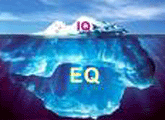 As a leader, you need to develop emotional intelligence skills to overcome various managerial challenges
As a leader, you need to develop emotional intelligence skills to overcome various managerial challenges“A LEADER’S singular job is to get results”, said influential author Daniel Goleman in the Harvard Business Review. But even with all the leadership training programmes and “expert” advice available, effective leadership still eludes many people and organisations.
One reason, says Goleman, is that such experts offer advice based on inference, experience and instinct, not on quantitative data.
The term “emotional intelligence (EI)”, is often used interchangeably with the term “emotional quotient (EQ)”, and became popular after Goleman published his first book called Emotional Intelligence in 1995. In another best-seller, Working With Emotional Intelligence, Goleman pointed out that IQ only accounts for 20 per cent of a person’s success in life; the rest is attributed to other factors, including EQ.
EI refers to the capacity for recognising our own feelings and those of others, and for motivating and managing emotions in ourselves, and in our relationships.
It is appropriate to discuss EQ in the context of an emotional challenge from the Greek philosopher Aristotle, who said: “Anyone can become angry — that is easy. But to be angry with the right person, to the right degree, at the right time, for the right purpose, and in the right way — that is not easy.”
Typically, everyone gets anxious, frustrated, worried and even angry at times. It’s human to feel these emotions, but brain researchers have recently found that experiencing them actually inhibits cognitive function. This is referred to as cortical inhibition, or “amygdala hijack” as Goleman termed it.
So, the old saying, “I was so upset I couldn’t think straight” is actually true. Think about the last time you got mad at yourself for hitting a bad golf shot. What happened to your performance after that? It got worse.
When you experience negative emotions, you are not as likely to make the best decisions.
Managing emotions
It seems that no matter where you are, there are always some people who are difficult to get on with. They are exceptionally prickly, remarkably self-centred and inconsiderate.
You wonder: “What’s with these people? What planet are they living on? Do they go out of their way to be especially unpleasant and uncooperative?”
Difficult people have the potential to take up an enormous amount of our time and energy. You find yourself continually in conversations with others about their shortcomings. In doing so, you use up a lot of the planet’s oxygen, and it doesn’t change a thing.
Studies have demonstrated that leaders who consistently outperform their peers not only have the technical skills required, but more importantly, have mastered most of the aspects of EI.
In the November/December 1998 issue of the Harvard Business Review, Goleman’s landmark article, What Makes A Leader?, stated that the five components of EI at work are self-awareness, self-regulation (or management), motivation, empathy (social awareness) and social skills (relationship management).
Drawing on research involving more than 3,000 executives, Goleman explored which precise leadership behaviours yielded positive results.
The findings were published in his subsequent article, Leadership That Gets Results, in the March/April 2000 issue of the Harvard Business Review. In the article, he outlined six distinct leadership styles, each one springing from different components of EI.
Each style has a distinct effect on the working atmosphere of a company, division or team, and, in turn, on its financial performance. The styles, by name and brief description alone, will resonate with anyone who leads, is led, or, as is the case with most people, does both.
Commanding leaders demand immediate compliance. Visionary leaders mobilise people towards a vision. Participative leaders create emotional bonds and harmony. Democratic leaders build consensus through participation. Pace-setting leaders expect excellence and self-direction. And coaching leaders develop people for the future.
Organisations need leaders to visualise the future, motivate and inspire employees, and adapt to changing needs. Human capital management firm DBM’s research indicates that with the right leadership development support, including executive coaching, those with leadership potential can be developed into outstanding leaders.
EI competencies are perhaps the most challenging for leaders to develop effectively and yet they are the ones that often have the most impact.
Conclusion
If the leader is able to manage emotions, both his and those of the people he is trying to work with (his boss, peers and subordinates), he can make better decisions about what to do or not do when facing various managerial challenges. He will be able to spend more time doing his job and waste less time worrying about political manoeuvres.
A leader needs to continually develop his EI skills. Using emotions as a source of information and learning to choose emotions allow rational thinking to prevail.
Leaders who demonstrate these skills are able to think clearly about how they can work within the changes. They are much less likely to make an irrational decision to leave the company just when they are needed the most.
Article by Professor Sattar Bawany, head of Transition Coaching Practice at DBM Asia Pacific and Adjunct Professor of Strategy at Paris Graduate School of Management. DBM is a leading global human capital management firm. Website: www.dbm.com E-mail: sbawany@dbm.com
Leave a Comment: